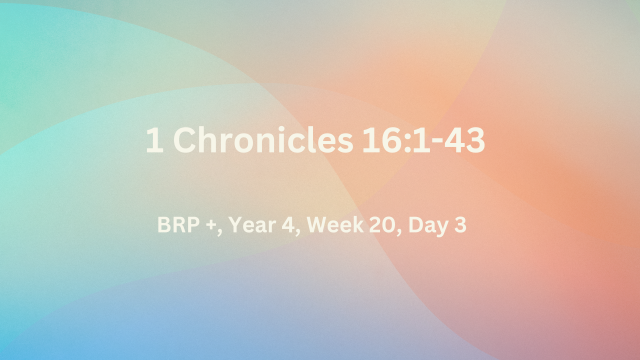1 Chronicles 16:1-43
Q.1. How did David make sure that the relocation of the Ark at Jerusalem would not be soon forgotten? How costly was his worship? – (1 Chr.16:1-7)
David made burnt and peace sacrifices of perfect animals as the sinners’ substitute, plus voluntary offerings, foundational for fellowship with God (1 Chr.16:1-2). As well as this, he gave every man and woman a loaf of bread, some meat, and a raisin cake (1 Chr.16:3). Everyone was engaged in the joy of worship (1 Chr.16:7 & 36). David had instructed the Levites to compose a special Psalm of praise, complete with instrumental accompanying of the choir (1 Chr.16:4-7). The melody and words would long be remembered by the people (1 Chr.16:8 & 36). It was a costly offering, even for the king.
Q.2. What did the Psalm of thanksgiving celebrate? How does it reflect on God? To whom was this Psalm delivered? – (1 Chr.16:8-36)
Korah had rebelled because he felt that as a Levite, he was being treated like an inferior servant (c.f. Num.16:1-3). However, David had honoured the Levites by giving them the function of providing beautiful worship in song … and even writing Scripture (c.f. Psalms 73-85). Whenever the people visited the Tabernacle they would learn these songs, which brightened their lives as they went about their daily duties. This Psalm reminded them of the character qualities of God, and of what He had done to bless His people (1 Chr.16:8-11). It highlighted the blessings of the Covenant – remember His covenant forever; the word which He commanded to a thousand generations (1 Chron.16:15). The Psalm called on Israel to – proclaim good tidings of His salvation from day to day. Tell of His glory among the nations; His wonderful deeds among all the peoples (1 Chr.16:23-24). On account of His Covenant faithfulness and constant deliverances, God is to be praised … and feared above all others (1 Chr.16:25-34). They were to look to the Lord and cry out – Save us, O God of our salvation, and gather us and deliver us from the nations to give thanks to Your holy name and glory in Your praise. Blessed be the Lord, the God of Israel, from everlasting even to everlasting (1 Chr.16:35-36).
Q.3. Why did David maintain Hebron as a place of worship? How did he lay the foundation for lofty worship at Jerusalem? – (1 Chr.16:37-43)
David reigned for forty years – he reigned seven years in Hebron, followed by thirty three years at Jerusalem (1 Chr.3:4). As a young king, David had constantly waited on God as he sought to establish his realm. He would have had many memories of the original place from where he had reigned. David was a passionate worshipper of God, thus maintained both Hebron and Jerusalem as places of worship. God had blessed the priests and Levites. There were ample to serve at both places – So he left Asaph and his relatives there before the ark of the covenant of the Lord to minister before the ark continually, as every day’s work required (1 Chr.16:37). Hebron was also a vital place, where David – 39 … left Zadok the priest and his relatives the priests before the tabernacle of the Lord in the high place, which was at Gibeon, 40 to offer burnt offerings to the Lord on the altar of burnt offering continually morning and evening, even according to all that is written in the law of the Lord, which He commanded Israel (1 Chr.16:39-40). They were accompanied by the families of the Levites – Heman and Jeduthun, who provided majestic praise and worship of God. There is little doubt that God loved David for his enthusiastic worship and music.

